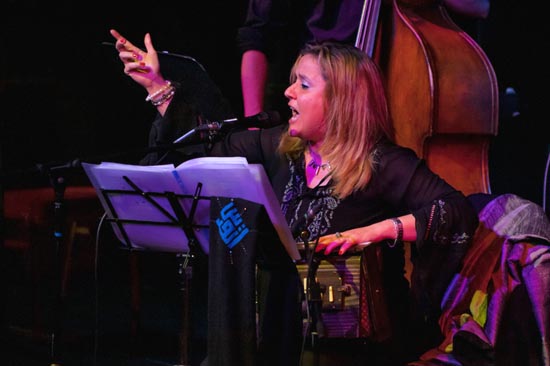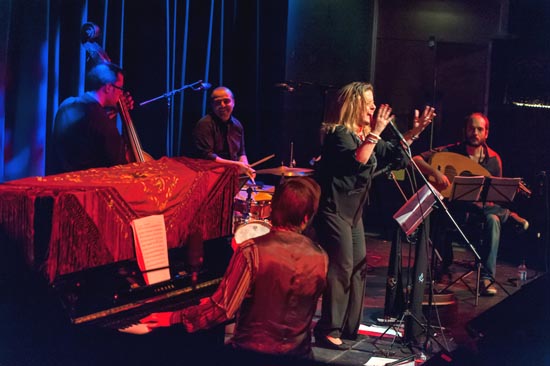|
Live at the Tabernacle with Reem Kelani
|
|

Reem Kelani
Sprinting Gazelle was remarkable for being deeply rooted in Palestinian village music, full of songs learned from elderly women in the Galilee region and refugee camps in Lebanon. The album is a wonderful mix of tracks. Some sound very “folk,” as though straight out of the village, featuring Reem singing and playing percussion. We might call other tracks “global” in their sound (Reem dislikes the term “world” music). On them, Kelani is backed by a first-rate band that included prominent UK musicians like jazz pianist Zoe Rahman, Idris Rahman (reeds) and Samy Bishai (violin). Zoe Rahman and Samy Bishai subsequently went on to work with Natacha Atlas, and so since Gazelle, Kelani has found and collaborated with a new set of backing musicians. Based in England, she has usually found it necessary to perform with non-Arab musicians to present her repertoire. Live at the Tabernacle demonstrates that she has trained her band very well. She is fortunate that for the occasion, Cairo-based Palestinian oud player, Tamer Abu Ghazaleh (a remarkable solo performer in his own right) happened to be in town, and so he sat in place of her usual saxophone player.
Then comes a shift in repertoire and mood, with a couple of Egyptian songs by celebrated composer Sayyid Darwish, with lyrics by Badia Khayri. Kelani calls Darwish and Khayri the Brecht-Weill of their day, and the comparison is dead-on. These are show tunes, written and performed for popular musicals staged in Cairo during and after the 1919 nationalist revolt against the British colonial occupation. “The Porters’ Anthem” deals with the reaction of an important segment of the Egyptian working class to the political events of the day, with observations that lampoon the restrictions that the British imposed upon the occupied people. “The Preachers Anthem” is a hilarious number where religious scholars comment on the end of the First World War. The hardships of the war now over, they plan, among other things, to visit Europe and experience that continent’s beautiful women. The arrangements are a delight, very true to the spirit of songs that were originally composed for the stage, performed with the backing of a European musical ensemble conducted by Darwish’s maestro, a Signore Casio. By doing Sayyid Darwish in music-hall style and by reviving these songs of such tremendous wit and revolutionary spirit, Kelani breathes new life into a repertoire that is most often treated in the Arab world with the kind of reverence that deadens its spirit.
Next, a stately, mostly instrumental number that pays tribute to Sayyid Darwish, as Reem reads a poem (in English translation) by celebrated Gaza poet Mu’in Bseiso. It’s followed with a song made famous by the late Tunisian singer Hedi Guellal, who was a major star in his home country and a progressive icon, and who might be compared to Lebanon’s Marcel Khalifeh or Egypt’s Sheikh Imam. “The Ship Sounded its Horn” treats the plight of North African Arab emigrants to Europe in the seventies, “on their way to far-off lands/Where the pain of exile burns like unquenched thirst.” It resonates with the experiences and sentiments of those traveling to Europe across the Mediterranean today. Only now the migrants often travel in worsened circumstances, not on ships but on rafts and dinghies, and without passports or visas. The number also pays tribute to Tunisia’s role in sparking the Arab Spring, which Hedi Guellal lived to witness. Despite the disastrous turn that post 2010 revolts have taken in much of the Arab world, Tunisia still stands as a hopeful symbol. The arrangement is driving, sparkling, jazzy, and one hopes that Kelani’s version will help increase the stature of Guellal, who is hardly known in the Arab world outside of Tunisia.
The song “Yarmouk” is named after a Palestinian refugee camp in Damascus, Syria, whose residents have suffered unspeakable horrors in Syria’s ongoing civil war. Kelani composed it for a French documentary about young Palestinians in the camp, called Les Chebabs de Yarmouk. (The CD includes a five-minute segment from the film, featuring “Yarmouk.”) It is appropriately melancholy, conveying the condition of the young Palestinians who are the subject of the film, who feel trapped, with no good options or future, yet who continue to strive and create. Finally, Kelani lifts us back up with her concluding number, “Giving Praise” (Il–Hamdulillah, or praise be to God), an extended, celebratory tribute to God.
 Ryan Trebilcock, Antonio Fusco, Bruno Heinen, Reem Kelani, Tamer Abu Ghazaleh Kelani’s backing band really shines throughout on Tabernacle, they’re a tight, supremely well-rehearsed machine whose members are also able to improvise brilliantly. They’re a kind of updated, globalized (in the good sense) version of the small Arabic ensemble known as the takht, whose place was taken by the large orchestra in the neo-classical tradition that came to dominate twentieth century Arab music, a development that tended to cut down on traditions of improvisation. Although the songs here are all in Arabic, Kelani is able, through her brief but to-the-point introductions and commentary, to help non-Arabic speaking audience members to understand what the songs are about and to feel themselves a part of the experience. At appropriate moments, she is able get the diverse audience to come together and participate, as on “The Ship Sounded its Horn,” where she encourages them join in making the sound of the steamship, or on “Giving Praise,” where she mobilizes them to sing along on the phrase, “il-hamdillah,” praise be to God/Allah. Kelani’s performance is supremely energetic and kinetic, moving between slow somber moods and the celebratory, full of shouts, claps, improvised vocals (known as mawwals in Arabic), ululating, and foot stomping, all leavened with good humor. It is so engaging that one really wishes one could have been there in person.
The CD packaging is also a marvel, beautifully put together, with detailed liner notes that explain the songs and their context. And there is the added bonus of transcriptions of the Arabic lyrics and careful translations, something almost never found in recordings of Arabic music. If you’ve ever tried to translate song lyrics (and I have attempted to do so with two songs on this recording), you know how difficult and time-consuming such a task can be. On Tabernacle, Reem Kelani offers listeners an introduction to the deep tradition of Palestinian music, and especially the lively rural women’s repertoire, not well documented or otherwise performed on stage. She does them both in what is very close to the original style, as well as offering up contemporary interpretations that enhance rather than detract from the original roots. In addition, showing her skill at moving across genres, she also explores important examples from the Tunisian and Egyptian repertoires. Kelani has been working for several years on a project of recording the work of Sayyid Darwish, an endeavor that was unfortunately interrupted by conditions attendant upon the Egyptian uprising and counterrevolution. The two songs on this album offer a foretaste of the Darwish project, and one hopes that that project will be forthcoming shortly. - Ted R. Swedenburg Find the artist online
All audio ©2016 Reem Kelani and Fuse Records.
© 2016 RootsWorld. No reproduction of any part of this page or its associated files is permitted without express written permission.
|

|
|
|